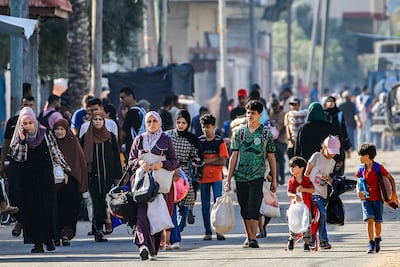Live updates: Follow the latest news on Israel-Gaza
Before the war, walking was Yasmeen Shawabka's favourite form of exercise and her daily routine included a morning stroll along the Gaza city corniche. Now she loathes the route as the relaxing scenery of the seafront has been replaced by rubble and destruction.
But Palestinians in Gaza have been left with very few options for getting around due to a shortage of fuel for vehicles. As with other essential items, what little there is has become very expensive because of the limited supply created by Israel's restrictions on the entry of goods as it continues its war against Hamas.
Some residents with vehicles, including taxi owners, have resorted to mixing petrol with cooking oil, while for others the rise in taxi fares has left donkeys, cycles or walking as their only alternatives.
“Walking has become a habit that we don’t enjoy as much because we are forced to do it due to the circumstances,” Ms Shawabka told The National. “We are also forced to walk through the destruction and see it everywhere around us.”
Most of Gaza's infrastructure have been destroyed in the eight-month war, which has also claimed more than 37,300 lives and injured more than 85,500 people, according to the enclave's Health Ministry. It followed an attack by Hamas that killed about 1,200 in Israel.
Most of Gaza's population has been displaced by Israeli attacks and fighting, many of them several times.
Ms Shawabka, who has three children, is adjusting to the reality of wartime. “I walk for distances exceeding 10km due to the lack of sufficient transportation,” she said.
With the arrival of summer, she wakes up earlier to get her errands done before the temperature rises past 30ºC.

Despite the ordeal that walking has become, Ms Shawabka prefers it to taking a taxi. “Even when transportation is available, the prices are prohibitively high, and the smell of burning cooking oil suffocates me,” she said.
“If we were to travel by car, we would need around 100 shekels [about $26] every day to reach our destinations, which is an impossible amount for a family in northern Gaza to afford right now.”
In addition to the smell, using cooking oil to run vehicles can permanently damage an engine.
Hassan Taima, a mechanic in northern Gaza, said he had received many cars damaged by the use of cooking oil as well as others that stopped working after months parked up.
“Unfortunately, the lack of tools makes it difficult to fix these cars, making other means of transportation such as animal-drawn carts or bicycles more effective,” he said.
Even bicycles also come with problems.
Shadi Abu Zaid, from the Jabalia refugee camp in northern Gaza, said he bought a bicycle at a higher price than before the war due to the increase in demand.
While it had proved useful, particularly when searching for food to take back to his family, the damaged roads littered with rubble and broken glass meant punctures were a hazard.
“The repair costs are very high compared to prewar prices because there are no spare parts available, and most stores and warehouses have been bombed and destroyed,” he said.
He said people stopped going out in the early days of the war, both because of the scarcity of fuel and the danger of Israeli strikes. But as Israel intensified its attacks, people were forced to leave their homes to seek safety in other areas.
“People turned to using animal-drawn carts and bicycles extensively, as they didn't require fuel and were more readily available,” Mr Abu Zaid said.
Now, after months of war, “people have become accustomed to moving from place to place, operating on the belief that life must go on”.



